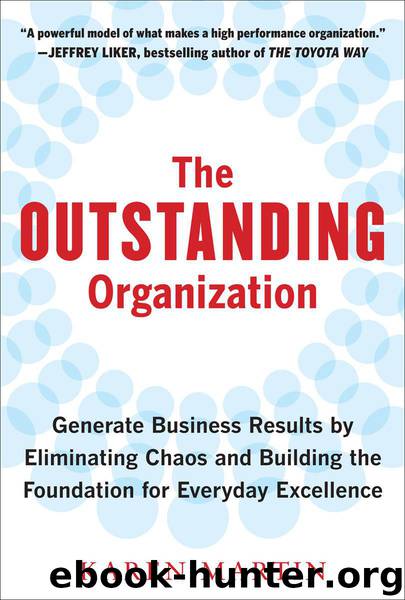The Outstanding Organization: Generate Business Results by Eliminating Chaos and Building the Foundation for Everyday Excellence by Karen Martin

Author:Karen Martin [Martin, Karen]
Language: eng
Format: mobi, azw3
Publisher: McGraw-Hill
Published: 2012-06-11T14:00:00+00:00
4
Discipline
We are what we repeatedly do. Excellence
then is not an act, but a habit.
—ARISTOTLE
What do world-class athletes, musical virtuosos, Pulitzer Prize winners, and elite military teams all have in common? They express their respective talents with predictable precision, achieved through disciplined practice. Rafael Nadal, Yo-Yo Ma, Steven King, Seal Team Six, and many other top performers—regardless of their area of expertise—don’t just show up when they feel like it and dabble around the edges, refining the easy stuff. They practice every day, usually at the same time in the same way. They warm up, and do calisthenics or scales. They practice the moves they already know and do well, but the core of their practice is dedicated to tackling a pressing problem that, once mastered, will bring them to the next level.
Psychologist K. Anders Ericsson defines this as deliberate practice. His research shows that top performers are obsessively error-focused. They set a target, and when they don’t achieve it, they “go back to their prior analysis to assess where they went wrong and determine how to avoid future errors. They continually work to eliminate their weaknesses.”1 In his book, Talent Is Overrated, author Geoff Colvin echoes Ericsson’s findings. Colvin noticed that top performers relentlessly reflect, during which they evaluate the specific elements of their performance that “misfired” and seek to prevent it from happening again.2 For Nadal, misfiring may be a weak serve; for Ma, a rough transition in a new piece he is perfecting for performance; and for the Seal Team, a tiny glitch that could have had fatal implications. Each in his or her own way breaks down the problem, identifies a countermeasure, and then practices it. They record or have a third party observe the practice, analyze the results, adjust to account for new information, and then practice again. Practice, analyze, adjust, practice, analyze, adjust, practice, and so on.
Now think about your organization. To what degree does it operate with predictable, low-variation precision? To what extent have you identified what each process’s version of “misfiring” is? To what extent does every person operate from clearly defined processes that are consistently measured? To what degree do employees practice, practice, practice to become better and better problem solvers? To what extent do you relentlessly reflect, determine root causes, and adjust via formalized continuous improvement? If the answer to any of these questions is, “Less than I’d like,” you’ll benefit from investing in discipline.
THE BENEFITS OF DISCIPLINE
In Good to Great, Jim Collins asserts that great companies have strong cultures of discipline. Collins and his research team found that greatness results from disciplined people engaged in disciplined thinking that leads to disciplined action.3 In his later book, Great by Choice, Collins finds that great companies adapt to changing business conditions by being thoroughly prepared, rehearsing responses, and planning for every conceivable contingency. He uses the example of one team that survived a trip into a sub-freezing wilderness and another where everyone died. The team that survived had planned carefully and approached every step thoughtfully; those who died were winging it.
Download
The Outstanding Organization: Generate Business Results by Eliminating Chaos and Building the Foundation for Everyday Excellence by Karen Martin.azw3
This site does not store any files on its server. We only index and link to content provided by other sites. Please contact the content providers to delete copyright contents if any and email us, we'll remove relevant links or contents immediately.
Hit Refresh by Satya Nadella(9126)
The Compound Effect by Darren Hardy(8949)
Change Your Questions, Change Your Life by Marilee Adams(7760)
Nudge - Improving Decisions about Health, Wealth, and Happiness by Thaler Sunstein(7693)
The Black Swan by Nassim Nicholas Taleb(7109)
Deep Work by Cal Newport(7066)
Rich Dad Poor Dad by Robert T. Kiyosaki(6612)
Daring Greatly by Brene Brown(6504)
Principles: Life and Work by Ray Dalio(6422)
Playing to Win_ How Strategy Really Works by A.G. Lafley & Roger L. Martin(6247)
Man-made Catastrophes and Risk Information Concealment by Dmitry Chernov & Didier Sornette(6007)
Big Magic: Creative Living Beyond Fear by Elizabeth Gilbert(5756)
Digital Minimalism by Cal Newport;(5750)
The Myth of the Strong Leader by Archie Brown(5500)
The Slight Edge by Jeff Olson(5410)
Discipline Equals Freedom by Jocko Willink(5379)
The Motivation Myth by Jeff Haden(5205)
The Laws of Human Nature by Robert Greene(5173)
Stone's Rules by Roger Stone(5081)
